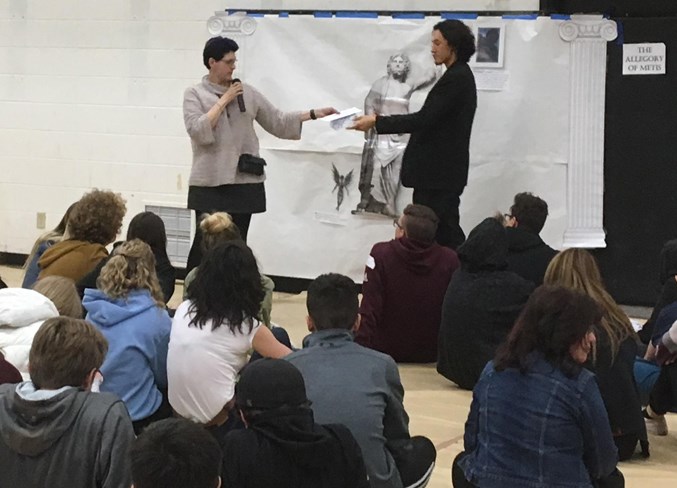He fought in the Iraq war. Now he's advocating for peace.
And Paul Chappell, 38, a peace literacy director for the Nuclear Age Peace Foundation, says we could achieve peace -- or at least get much closer -- if we changed our education system.
He and a team of presenters brought that message to Olds High School students at Frank Grisdale Hall gym on Nov. 19.
"Everything people want to do well in life they realize they have to get training (for it)," he said during an interview with the Albertan.
"If people want to be good at business or journalism or basketball or baseball or football or playing the violin or martial arts (they need training for that). Peace is the only thing that people think they don't have to know anything (to practise). And people don't take peace seriously.
"And if people took peace as seriously as the military takes war, or if people took peace as seriously as people take basketball in terms of training for it and getting better at it, the world would be much different."
"People aren't being taught how to solve problems -- or the root causes of problems. People are being taught how to deal with the symptoms but not being taught how to solve the root causes of problems."
The problem, Chappell says, is that educators are looking at peace the wrong way. Peace and how to build it should be taught in the same way that other subjects are.
"I've been doing this full-time for 10 years and over the past 10 years, teachers would often say to me, 'can you come to the high school or middle school or elementary school? And can you talk to the students for half an hour about peace?'
"And the teacher would never say, 'can you come to the school and talk to the students for half an hour about algebra and maybe next year we'll do another half hour on algebra.'
"We realize in our culture that literacy in reading and writing, literacy in math, are competencies. We have to view peace literacy as even more complex. It's a competency even more complex than literacy in reading and writing," he said.
Chappell has first-hand experience in moulding a peaceful outlook after a tough upbringing.
He was born and raised in Alabama. His father was of mixed black and white race and his mother was Korean.
As a result he says he was an "outcast."
"I developed a lot of behavioural problems as a child," Chappell said. "I was kicked out of elementary school for fighting, almost kicked out of middle school. I was suspended in high school for fighting.
"All that trauma and rage and alienation caused me to develop a mass shooter personality in high school. And so every day, I would fantasize about shooting the kids in my classes."
Eventually, at the urging of his parents (Chappell's dad had fought in the Korean and Vietnam wars), Paul joined the army, graduating from the famous West Point academy.
In 2006, he did a six-month tour in Iraq. He quit the army in 2009, joining the Nuclear Age Peace Foundation.
Chappell says ironically, he learned skills that can promote peace during his time in the military. That journey began before his military service, but became more focused as a result of that time.
Those skills include leadership, understanding human behaviour and how to interact with people, how to resolve conflict, and how to motivate people.
"My initial interest in peace was more -- like, how do I heal my rage and my trauma and my alienation and the fact that these are things that I wasn't taught by our education system," he said.
"It was a long, very slow burn throughout my upbringing that really kept magnifying and magnifying and magnifying."
Chappell said in order to promote peace, people need to learn how to deal with aggression, convey respect, listen with empathy, resolve conflict, how to calm themselves down and how to calm other people down.
"I mean, calming ourselves down and calming other people down are really important life skills that most people don't learn," he said.
"The whole idea there is that soldiers get excellent training in how to wage war, but most people get no training in how to wage peace and what if people were as well trained in how to wage peace as soldiers are in how to wage war," he said.
"In 1948, education and reading and writing were recognized as a human right," Chappell said. "One of our goals is by 2028 to have education and peace literacy recognized as a human right; that if we don't give people these basic peace skills, we're setting them and our future up for failure."



